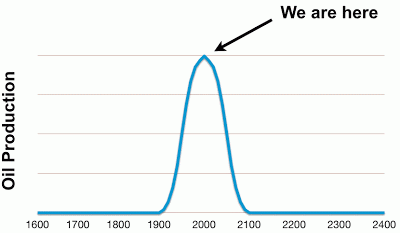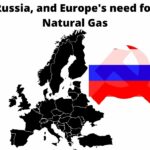World oil supplies – of the easy-to-get oil, anyway, are at their peak. Our appetite for oil products has led the oil companies to drill for oil in all kinds of places. Of course they drilled the easiest-to-tap fields first, because those gave the best return on investment (dollars spent setting up the oil field divided by revenue from selling the oil). As the easy-to-tap oil became scarcer, oil drilling operations have grown more difficult, requiring different technologies, at greater cost.
That’s the basis for the Peak Oil theory. First, that there’s a limited supply of Fossil Oil on this planet, and second that much of it is difficult (expensive) to tap.
It wasn’t until world Oil prices rose to a high level that the expensive-to-tap oil became profitable. If you think over the last few years, gasoline prices ratcheted upward, first rising from the $1 to $2 neighborhood, then to $3, and now gasoline prices are hovering between $4 to $5 per gallon. These are California prices, but a similar pattern has played out elsewhere in the US even if the exact numbers are different.
That rising price for gasoline is a symptom of Peak Oil. Another symptom is that the oil companies are now looking at the hard-to-tap sources.
Rachel Maddow covered on her show last night two instances of this symptom. The first is the infamous Teapot Dome field, that caused the largest scandal in American Politics before the Watergate Scandal. The second is plans drilling for oil in the Arctic.
Where Maddow and I diverge is on the wisdom of doing this at all. She seems comfortable with continuing to use oil products, if only the companies would do it safely. What I say is that we need to stop using oil products entirely, and move rapidly to other sources of energy like Solar/Wind.
In any case, these two reports are strong symptoms of Peak Oil.
It’s also extremely troubling that the Oil industry is moving forward with plans to drill for oil in the Arctic, even though they don’t know how to handle the inevitable oil spill. What’s their plan? To purposely cause an Oil Spill so they can study how to clean it up.
This is the sort of news that should cause outrage and protests in the street. But, it may be like the scene I saw earlier this week at the What The Frack meeting. Fracking is also a symptom of Peak Oil, and is also thought to be causing environmental degradation and fracking-induced-earthquakes. But, there is little outrage, not much protest, over Fracking (in the U.S.), so will there be much protest over atrociously inadequate plans to drill for oil in the Arctic?
The continued use of Fossil Oil is a huge environmental problem from the threat of oil spills, to the toxic fumes in the atmosphere when that oil is burned, and the greenhouse gases that are causing climate change.
The continued use of Fossil Oil is also a huge geopolitical problem because what keeps our game of modern society afloat is the energy we get from Oil or Natural Gas or Coal. It is the huge machines we build that keeps modern society running. How will those machines keep running if Oil products are too expensive to make it profitable to run the machines? And if those machines become unprofitable, then how will modern society keep running?
- Highway design could decrease death and injury risk, if “we” chose smarter designs - March 28, 2015
- GM really did trademark “range anxiety”, only later to abandon that mark - March 25, 2015
- US Government releases new regulations on hydraulic fracturing, that some call “toothless” - March 20, 2015
- Tesla Motors magic pill to solve range anxiety doesn’t quite instill range confidence - March 19, 2015
- Update on Galena IL oil train – 21 cars involved, which were the supposedly safer CP1232 design - March 7, 2015
- Another oil bomb train – why are they shipping crude oil by train? – Symptoms of fossil fuel addiction - March 6, 2015
- Chevron relinquishes fracking in Romania, as part of broader pull-out from Eastern European fracking operations - February 22, 2015
- Answer anti- electric car articles with truth and pride – truth outshines all distortions - February 19, 2015
- Apple taking big risk on developing a car? Please, Apple, don’t go there! - February 16, 2015
- Toyota, Nissan, Honda working on Japanese fuel cell infrastructure for Japanese government - February 12, 2015












